War
1/29
There's no tags or description
Looks like no tags are added yet.
Name | Mastery | Learn | Test | Matching | Spaced |
|---|
No study sessions yet.
30 Terms
Masculinity, sisterhood & prostitution
How did war & military service shape understandings & experiences gender in modern world?
how gender informed understandings of wartime roles both in theatres of war and on the various 'home fronts' of the conflict. From this point we'll focus on the profound impact that WW2 had on ideas of gender across the world.
In the second lecture we'll explore the place of sex within war and how this reinforced and challenged peacetime gender norms.
Sisterhood
What might happen to societies where men have gone overseas?
Case study Ottoman Empire WW1 (end Ottoman Empire)
Yigit Akin
voic. issues
"Either deport us all to another place or cast us into the sea. We do not accept the law."
(31 Dec, 1917) Ottoman Grand Vizier & Interior Minister (Talat Pasha) rec. telegram signed by 10 desperate peasant 👩 ← Black Sea coast, all 👰s & 🤱s soldiers called off to military duty.
Complained ab. poverty & hunger ← harsh war🕑 policies Ottoman 🕑.
Huge 👨 levy (👨 sent to front lines to fight for OE in WW1) & only 👩 left behind to look after 👪 farm → responsible for agricultural production as well as domestic lab. but few resources
💧 pressures →
seed grainto sow fields.
Military commandeered mules, 🐴s, 🐑 & cattle + 🏠 → sleep. under 🌳.
Constant threat to 👩 ← deserters & refugees walking through countryside/ soldiers trav. to & ← battlefield, w/o 👨 there to ‘protect them’.
But also continued pressure contin. to provide 🍔 to Ottoman army.
Millions of men conscripted throughout Ottoman Empire (seferbeylik) from 1914-1918, women saw men leave their households and increasing intrusion from state into daily lives.
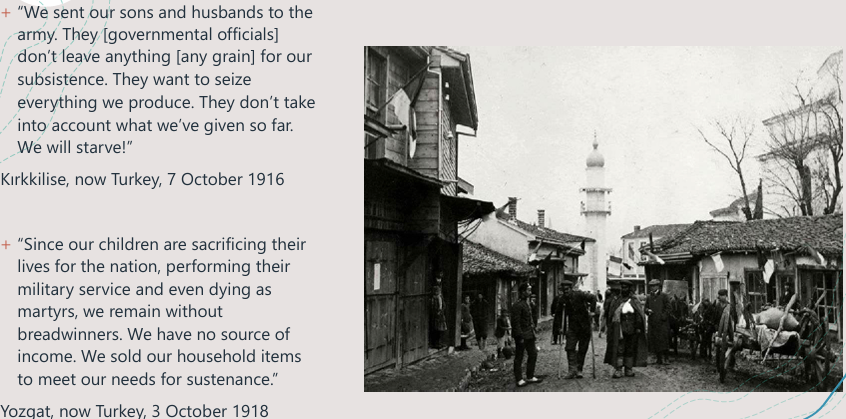
increasing intrusion ← state - changing rel. w/state but did increase communication
Women interacted w/state in new ways because of poverty & famine, writing telegrams, petitions & letters to state officials
change because meant now had direct rel. w/Ottoman Empire in way they hadn’t before
Sisterhood
What might happen to societies where men have gone overseas?
Case study Ottoman Empire WW1 (end Ottoman Empire)
Yigit Akin
tak. over
👩 suff. extreme trauma @ domestic hardship, tak. over bulk 🚜ing w/v/little resources.
Many these 👩 literate, their suffer. historicised in folk song.
Social disruption, 👩 tak. over men’s work alongside domestic duties in rural settings.
(urban areas) Econ. privations war🕑→ 👩 of all social classes forced to take on work.
👾 also introd. sep. allowance as financ. supp., hav. remov. many clauses meant sole breadwinners exempt ← military service.

Sisterhood
What might happen to societies where men have gone overseas?
Case study Ottoman Empire WW1 (end Ottoman Empire)
Yigit Akin
Separation allowance was there but also provided way to police women’s sexuality at home (whilst their husbands were absent)
because women’s payments cut off if they were thought to be conducting themselves immorally or unfaithful to absent husbands
What counts as immoral/ evidence often put down to rumour… subjective…
Sisterhood
What might happen to societies where men have gone overseas?
Case study Ottoman Empire WW1 (end Ottoman Empire)
Yigit Akin
How signif. was concept sisterhood to these women?
concept sisterhood really important to women on homefront dur. WW1 but also their maternal role as partner/ wife…
Not just sisterhood - their role as wife, mother… Even though men aren’t there, remain primary way women refer to themselves → identify (wife of soldeir… mother of…)
Sisterhood
Case study: Algerian War Dep., 1956-62
Natalya Vince
Disrupting narratives of women in Algerian war
“Powerful memorial discourses distort our view of history, shoe-horning it into a series of confrontations between binary opposites @ dramatic moments, & @ the same time we cannot deconstruct these memorial frameworks because we cannot historicise them.”
“A post-
dep.history of Algeria beyond the frames of violence, trauma, interminable decline ^ the Franco-Algerian lens.”
Moving aw. ← histories viol. through imperial lens.
Sisterhood
diff. ways women involved in warfare
Case study: Algerian War Dep., 1956-62
Natalya Vince
define ‘Mujahidat’
how gender → matyrdom
Did offer women opportunities?
define ‘Mujahidat’
Women who left their homes & families to join the FLN armed guerrilla bands, the ALN.
Invariably young women usually unmarried who left their homes, with or without the approval of their families, to join the maquis, where the armed struggle largely took place.
"Mujahidat" (Arabic: مجاهدات) is the plural form of "Mujahida" (Arabic: مجاهدة), which refers to a female warrior or fighter engaged in jihad. The term "jihad" (Arabic: جهاد) is often translated as "struggle" or "striving" and can have a broad range of meanings, from an internal, personal struggle for self-improvement and faithfulness to the struggle for justice or the defense of the Muslim community.
In a contemporary context, "mujahidat" are women who participate in these struggles, which could encompass a variety of roles such as fighters, supporters, activists, or those engaged in spiritual or social efforts within an Islamic framework. The concept can apply to historical figures, contemporary participants in conflicts, or women involved in broader efforts for social justice and religious observance.
how gender → matrydom
Their role as young women played role in understanding matyrdom - concept innoc. (driven to desperation by terror of the French state)
martyrs (face revol.)
nurses
actively fighting - planting bombs
facilitating, sheltering men invovled in guerilla warfare or providing food/supp…
Difficulty of women attaining this status impacts how they’re remembered (like how diffic. to gain official status as member French Resistance)
Bouhired, Djamila (1937—) | Encyclopedia.com
Were FLN-ALN & male combatants gen. accept. their presence in ALN
V/nature their particip. (involv. liv. in maquis outside their 🏠s, aw. ← their 🏠s & w/👨 related to them) chall. exist. order Algerian soc. & = remarkable developm. dur. war.
(Djamila Amrane)
10,949 FLN-ALN ♀ activists (3.1% FLN-ALN members)
Mujahidat totalled 1755/ 16% all 👩 activists
Though mujahidin initially opposed to hav. 👩 in maquis, event. came to accept them w/o reservation
‘During the interviews, it struck me that out of 47 women militants who married during or after the war, 38 are married with men militants. Now, for a fighter, to get married with a woman fighter is the best proof of accepting the fight she engaged in and of esteem for what she has been’
(Penny Summerfield) 👩 cherished memories their particip. in war effort in ways transgressed conventional gender identities, & used interviews as opportunities to achieve public recogn
👩 who spoke in this way ab. their wartime participation formed majority those interviewed, 24 /42
(mid.war) GLN-ALN remov. women ← marquis & to send them to either Morocco/ Tunisia
intensity of the war, deteriorating living conditions in the maquis, and the expected length of the war. She further stresses that women were not the only ones removed from the maquis and that male students were treated similarly
…OR gen. hostile to their presence?
During the war, in wila¯ya 3, ALN leaders tested the virginity of the mujahidat upon their arrival in the maquis.
(Maynier) Mujahidat integrated into ALN BUT FLN-ALN assigned them roles explicitly excluded them ← military activities, & only in exceptional circumstances did some 👩 carry small arms
Restricted to non-combatant, subordinate, civilian roles
Mostly remained segreg. ← 👨.
Stresses the suspicion that men harboured in regard to women who joined the ALN and records that few men in the maquis saw women as wanting to contribute to political discussions
GLN-ALN remov. women ← marquis
👩’s demand for equality w/👨 regarded w/deep suspic. & hostility + interpreted as demonstration low morality
👩
welcomein maquis, and ALN leaders, finding themselves confronted with young women they had no idea what to do with, settled the question quickly by removing them from the maquis. Meynier points out that from 1958 onward the FLN-ALN strictly forbade the enrolment of women in the maquis
(Harbi) rapes, executions and forced marriages within the ALN
The fact that not all women were removed from the maquis in 19578is perhaps the best indication that there was no uniform policy towards women.
most mujahidat from wila¯ya 2 remained in the maquis until the end of the war (Amrane 1991: 251). According to Amrane, those who remained were mostly the qualified nurses, that is, women with a particular skill in great demand.9 At the same time, nurses in other wila¯yat were removed, an indication that not one but several factors affected the decision to remove women from a particular wila¯ya. Sexual tension and misogyny almost certainly played their part, but the intensity of the war after 1957, the dismantling of infirmaries, and the purges and suspicions within the maquis no doubt also played their part. A close look at the existing historiography and at the sources highlights the complexity and the plurality of women’s experiences in the maquis a plurality that closely reflects the extreme divergences in the FLN-ALN from one wila¯ya to another (Seferdjeli 2005: 187202).
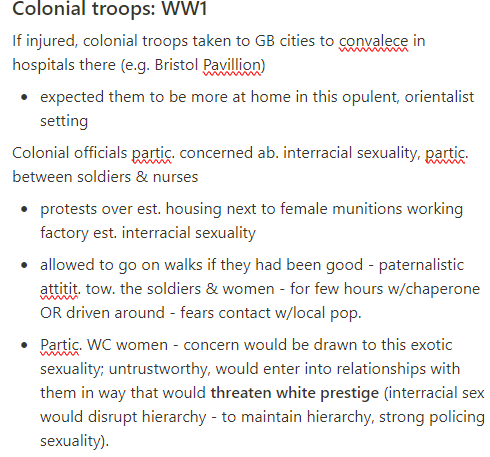
prostitution
What was the French attiti. to prostitution?
What was done as a result?
Why?
What?
(← 1802) Prostitution legalised but heavily regulated by French govt
Referred to as "French system"/regulationist system
👩 subject to intensive & exploitative ‘visites sanitaires’, genital inspections for venereal disease.
(@ 🕑) Syphilis could only be diagnosed visually (subjectively) →
If 🔎 to be ill, confined to dispensaries until cured, for months on end w/o proper scientific evid.
👩 had to be "mise en carte", given identity cards 🎭 their address & recent health checks
Solicit men on street(protect urban space ← hav. to see it → forced underground).
Why?
(Dr Anastasia Ryan)
🕑 increasing concern order, morality & regulated passion → reinvigorated/ grow. moral discours ab. prostitution.
System motiv. by protect. clients, protect. 👩.
French hygienists (Alexandre Parent-Duchatelet…) compared prostitutes to sewers & 👓 them as nec. evil,
poss.to avoid ∴ worth regul.Should take place underground/ out of sight for reasons of hygeine - need to be there but people don’t want to see it
Regulated to…
1. Minimise public nuisance assoc. w/prostitution
2. Brothels seen as moral & where public health → concern
Because military men were often unmarried and homosexuality was criminalized, prostitution was considered by military authorities to be a necessary evil, so long as the spread of venereal disease could be contained
prostitution
How did this endanger prostitutes?
As soc. thinks prostitution should be policed, controlled, matter stigma… puts women doing it more at risk
Created environm. where prostitutes dehumanised; not seen as people, seen as disposable & immoral
Violence. Legal framework exacerbates prostitutes’ vulnerability to violence.
Criminalised for solicitation on the street → must organ. their work in more hidden, isolated ways (aw. ß authorities & attention; rushed transactions w/clients → unable to assess safety (drunk…)
(UK, 1823) Mary McKinnon executed for stabbing even though evid. unsubstantial – evid. given by women credited by judge who even tells jury to ignore evid. 1 prostitute
Jack the Ripper
prostitution
How many prostitutes estimated France end C19?
How many men reg. clients?
15,000 prostitutes
1/4 men reg. clients
prostitution
Centrality to WW1 exper.
Many recollections young British/American soldiers include going to brothels, partic. oral histories kept @ Imperial War Museum archive.
Many y/soldiers = virgins who remember this as formative sexual exper.
Taumatised men looked to distraction of brothel space to entertain themselves.
BUT this chapter often overlooked in traditional histories.
Why?
This element warfare overlooked in trad. histories because…
viewed as shameful
top-down, military focus
nationalist focus on morality → triumphalist, jingoistic, sacrifice (everyth. Allies did was good) → these narratves sexual experiences overlooked because don’t necessarily fit w/judicial narratives
harder to teach to children (notice this wasn’t mentioned in the lecture)
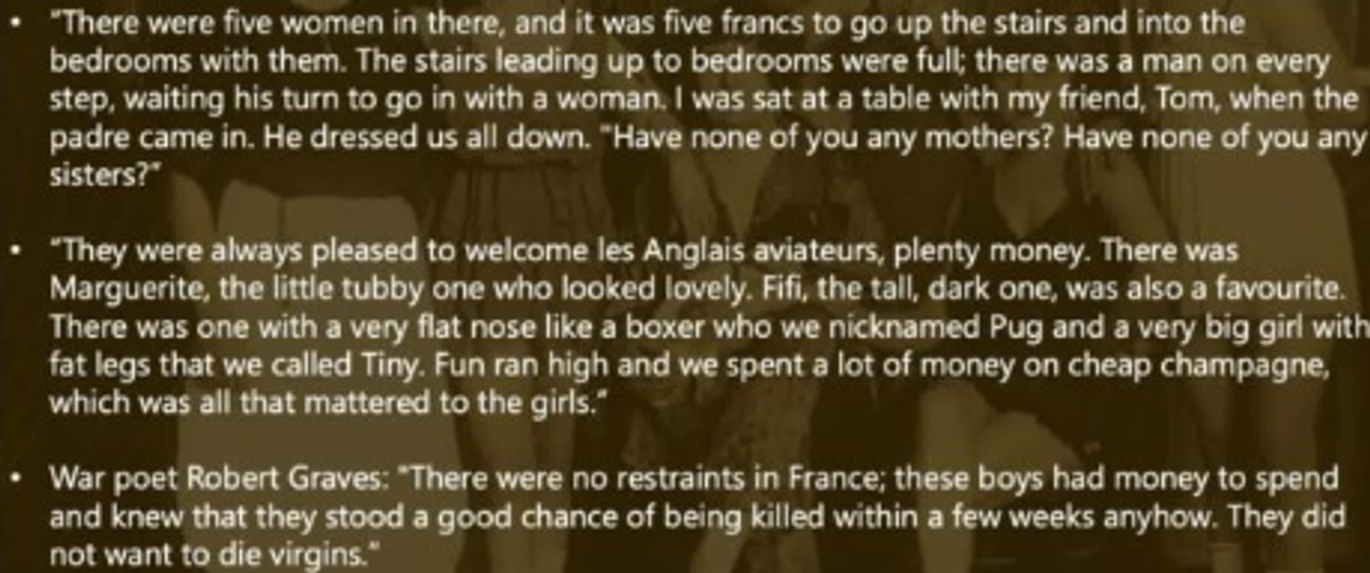
prostitution
How many cases venereal disease WWI?
How were men treated for venereal disease?
400,000
Men taken away ← front for treatm. month or so
(1st part WW1) officials wrote home to inform family the soldier being treated for venereal disease
1 man commtted suicide due to shame of deviant sexuality if his family being informed - ← having bought sex or having venereal disease
prostitution
theme sisterhood
women tog. in a space
Sisterhood – often these ‘taverns’ run by women trying to make ends meet. Women trying to sell their services. Communtiy.
prostitution
Bordels Militaires de Campagne (BMC)
used throughout…
purpose
poor working conditions
sim. links (should make FCs lol)
Mobile brothels used throughout…
Algeria ← 1830 dur. & follow. its conquest by French army
passific. proc. - many died through viol. (burning crops… link to not just defining viol. physically) → pushed more women into prostitution
France for North African troops ← 1914 (WWI & WWII) w/arrival indigenous units ← colonies
Brothels banned in metropolitan France ← 1946, French soc. uncomfortable w/how many brothels linked to Nazis
(1947) Around 300 Moroccan women transported to work in brothels in France after WWII, for North African soldiers still there.
French soldiers mobilised to France - took Moroccan & Algerian portable military brothels with them, tak. them to France to work in military brothels in French metropole
this was after brothels banned in France in 1946 (Nazi soldiers us. prostitutes → way purifying this history after end WW2) but fact colonial troops still there, fears would rape (sexual viol.) or turn to sexual relations w/local French women… → brought brothels with them in order to ‘protect’ local French women
1st Incochina War
Purpose
(← 1946) Brothels banned in metropolitan 🥖; 🥖 soc. comfy w/how many brothels 🔗 Nazis.
Feeling prostit. nec. evil to prevent sexual viol.
Because military men were often unmarried and homosexuality was criminalized, prostitution was considered by military authorities to be a necessary evil, so long as the spread of venereal disease could be contained
e.g. (May 1944) Mass sexual viol. tow. Italian 👩 by Moroccan soldiers: estim. 2000 👩 & 600 👨 raped.
Fear what could happen in 🥖 to 🥖👩.
Supply prostit. services to French solders fighting in areas where brothels usual (e.g. @ front line/ in isol. garrisons). Idea ws would follow men around in mobile, temp. camps so could buy sex when wanted to.
think regulating prostitution: these local women would be kept & expected to ensure they didn’t have any disease → French soldiers could buy sex more safely
Military command want indig. soldiers to have sex w/local women…
for racist & classist reasons
prevent troops gett. infected by venereal diseases (syphilis
curable@ 🕑 - penicillin only avail. ← 1944)
Poor working conditions
Little freedom/ indep., not allowed to leave the brothel., signed contract saying had to work there for e year but not allowed to go home, if wanted to go home had to pay… form exploitation & way French govt trafficked women into prostitution in order to police these racial boundaries
Sim. links
https://en.wikipedia.org/wiki/Recreation_and_Amusement_Association
United States military and prostitution in South Korea - Wikipedia
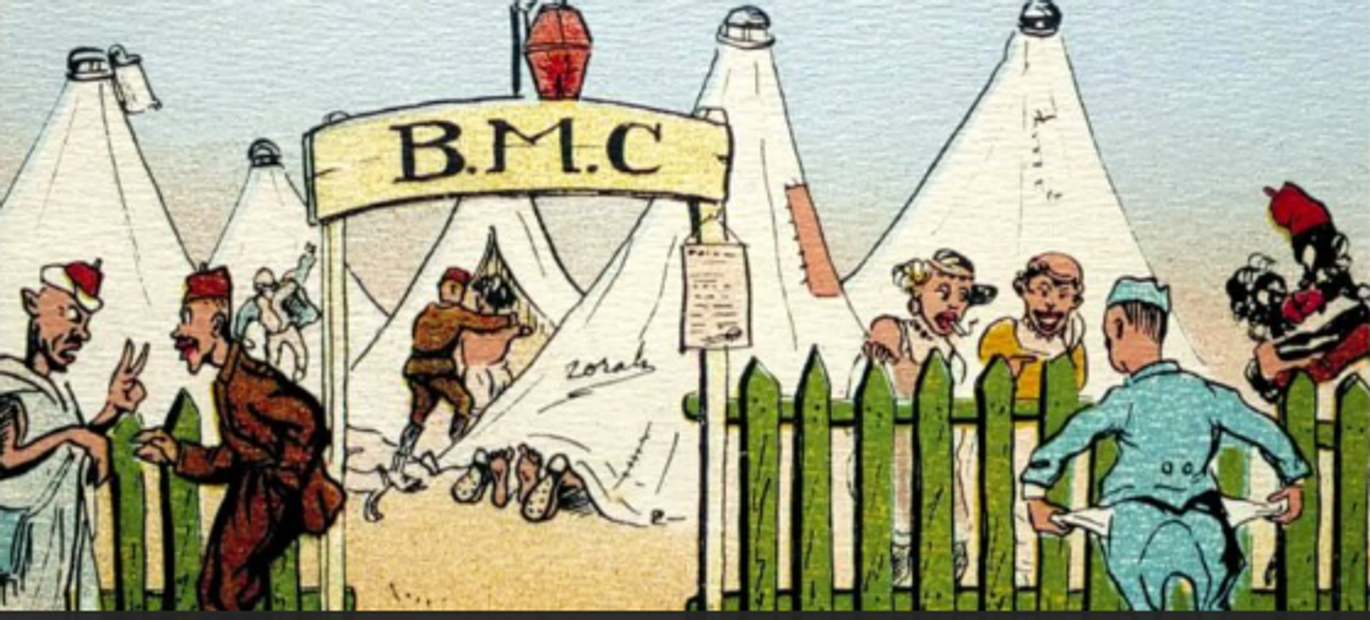
prostitution
comfort women
What?
(1932-45) Women & girls pushed into selling sex by Imperial Japanese Armed Forces.
Who?
50,000-200,000 women ← Philippines, Australia, Burma, China…Netherlands, Japan, Indonesia, but mostly (85%) ← Korea
Why?
Motivation was to avoid rape and venereal disease
How?
Captured 100,000s civilians (includ. women & y/girls forced into sexual slavery for benefit troops).
Many women tricked into joining brothels, lied to or paid money up front by recruitment agents
Mistreatment rife
multiple accounts of sexual violence, as well as physical and psychological abuse.
Up to 40 men a day.
Women were required to travel to battlefields with Japanese Imperial army, many died as a result
Reception today
Shame meant that many women kept silent until the 1990s. Many women and their families fighting for recognition 70 years later, ongoing fight for apology and recognition from Japan
Long denied by Jap. govt.
(19920 Jap. historian Yoshiaki Yoshimi
coveredoffic. documents 🔗 military to doing just this, helping to establish over 2,000 comfort women stations with over 200,000 women, some only in their early teens.The uncovering of these documents ultimately prompted an official apology & acknowledgement by the Japanese government.
Signif.
not case that women stay on home front & men go out to fight - these women required to travel to battlefields
women actively involved & present on battlefield in diff. ways - not just militarily
masculinity
Marraines de Guerre
What?
Why?
Role godmother
When?
Romantic developments
Popularity
Critic. & controversy
What?
System where women would write to isolated soldiers @ the front (often respond. to adverts in newspaper)
Portrayed as lonely heart advert: cheeky remark in hope getting letter
Supp.: benefited from high-profile patronage and free advertising in newspapers like L'Écho de Paris.
Why?
Sustain soldiers' morale dur. WWI (cut off ← emotional support & news ← families).
Role godmother
Means godmother - suppos. to play on feminine virtues & relig. lang.
Meant to be alm. relig. role (playing on role godparent to prov. relig. training & guidance to child, playing on idea femine virtues & maternal care)
Godmothers viewed as family figures, providing emotional supp. to soldiers.
When?
Emerged in WWI, reappeared in 1939; initially distrusted by the army and criticized by moralists.
Romantic developments
Evolved/shift… 👓n as…
Moral supp. as patriotic duty
Means for romantic engagem. (flirting by correspondence, a seminmental rel.)
Flirtation & ⚭ (after war) → common.
→ imbued w/sexuality & 👓n as flirtatious
Soldiers wrote to La Vie parisienne, embarrassed ab. what they wanted.
"Two young sub-officers seek corresp. with nice affectionate Parisian girls", wrote two gunners
Chief Marshall of Lodgings, Heufel, published this announcement: "The war is
measurablylong and I, too, would like to have a little affectionate and sentimental godmother who would make me forget the days that go by so slowly. Discretion of a gentleman ".
Popularity
Fantasy of the gentle godmother ran through the trenches; after all, was it not "another patriotic duty" to open up one's heart and one's bed?
(May-Aug. 1915) Light review Fantasio matched 6,000 soldiers w/godmothers.
Critic. & controversy
Moral Concerns…
Wartime godmother → scandalous social peril, reflect. declining morals
(25 Jan. 1917) "Hiding behind words of such pious and patriotic charity, people can cover up their cunning immorality"
Press: hailed godmothers as incarnation → patriotism denigrated & 🎭n as old 👧s throw. themselves into seduction game & tak. advantage circumstances.
(L'École des marraines (The School for Godmothers)) novelist Jeanne Landre mocked round & "low-slung" 50 👩 who "picked up ← a distance".
Gender concerns
Wartime godmother frightened the military services as much as the moralists; she embodied liberalisation morals & = free 👩 who wrote to 👨, w/o any supervision/monitoring.
Worse still, godmother’s existence = reminder heroes were beings of flesh & 🩸, that they suffer. & need. affection & were fragile & miserable.
But where was stoic, chaste & determined hero depicted in propaganda?
→ banned
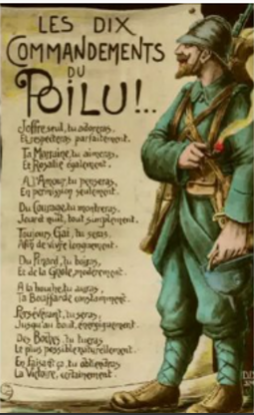
What are the different ways that migration & mass mobilisation can impact ideas of experiences of gender?
How can gender impact global migrations/ movements?
How can we use primary sources to access this?
place of sex within war and how this reinforced and challenged peacetime gender norms
queer experiences WWII
Some people found sexual poss. & opportun. in being mobilised
Mat Holbrook’s oral histories
1 RAF veteran recalled sixty years later: 'Let's face it You're queer and you're surrounded by men. I was living in a man's world and I was queer and you can't ask for much more than that.'
(Sarah Allen) Outbreak war = 'Godsend’ because it meant she could escape home & a succession interesting boyfriends by joining the ATS where she encountered queer women for 1st time + had her 1st physical same-sex relationship.
(John Beardmore) 'Wingers & oppos' system in the Royal Navy where 'wingers' were senior men assigned to mentor new recruits and 'oppos' were a similar age and rank to guide them.
There could also be a sexual element to this relationship: 'I know of fellows who were oppos & who were having affairs at the time who went on to → godfathers to each other's children.'
away from home, surrounded by sexual opportun.
out of home sphere, more opportunities
When American GIs → UK…
(Quentin Crisp) openly gay man in 1960s who wrote memoir ab. his life.
‘they flowed through the streets of London like cream on strawberries, like melted butter on peas… Never in the history of sex was so much offered to so many by so few.’
Overpaid, oversexed over here…
goes against understanding in British cultural memory that only women flocked tow. American GIs in way that seemed to irritate many men
Understanding within GB history that GB women flockced tow. American GIs in way annoyed British men
queer experiences WWII
Mobilis. (fighting alongside overtly gay people) opened people’s minds → less prejudiced agains gay people
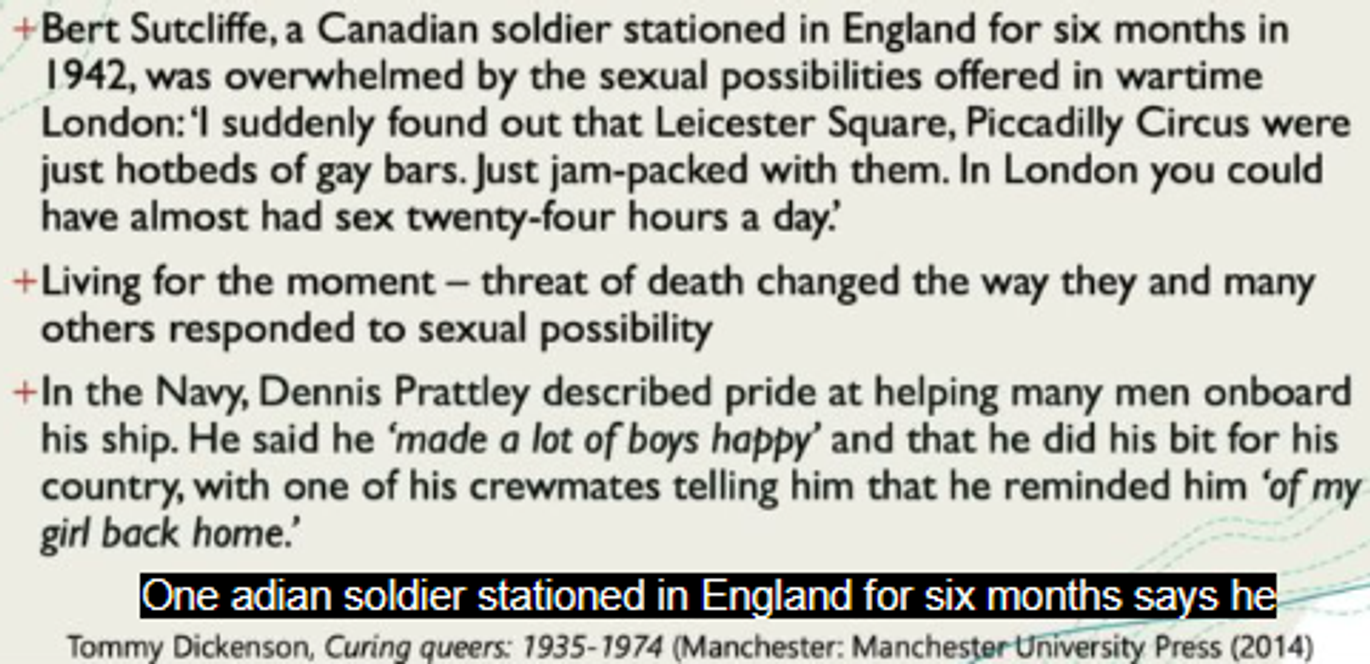
queer experiences WWII
situational homosexuality
Godfathering = important way they showed their closen.
Not all homosexuals saw it as homosexuality - saw it as not going against his desire to marry & have children but rather war = outlet for his sexuality
also difference bet. sexuality & sexual acts - homosexual acts yet didn’t see himself in that way
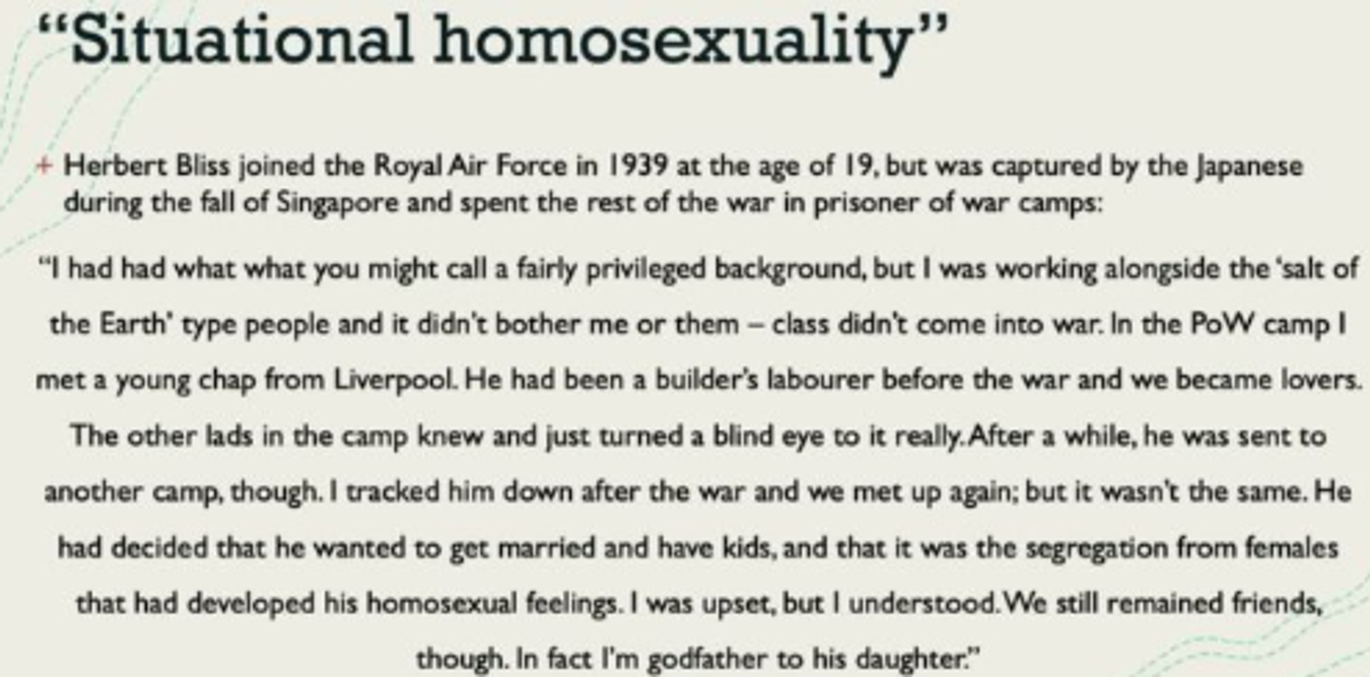
queer experiences WWII
GB policy on homosexuality in army
same sex common WW2 - many people report hav. liberal attit. tow. it
but diff. bet. seeing & knowing - had to stay secret because of threats people involved in + fact it was illegal to partake in homosexual relations until 1967 + disgrace being court martialled (explained below)
If found to be in relations like this…
threat court marshal
disgrace being court marshalled → imprisoned & couldn’t fight → not doing your bit
Though were opportunities for homosexual relations, policy clearly against it…
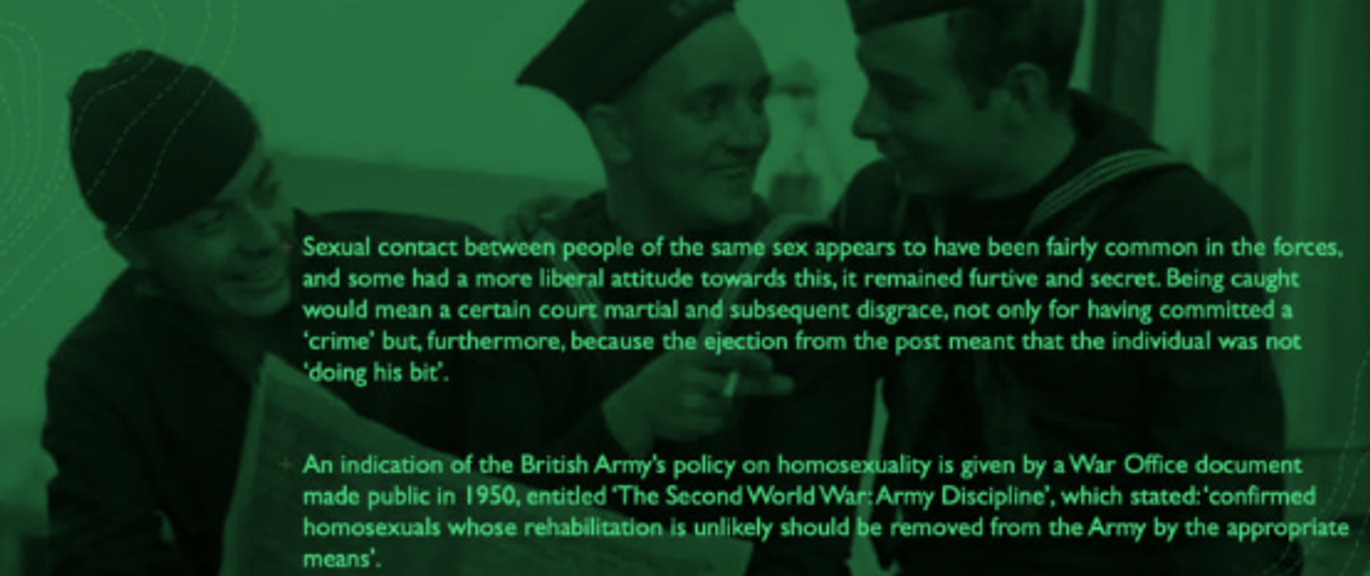
interracial sex WWII
GIs in GB
How many?
When arrive?
Kids
Anti-misceganation laws
How many?
↺ 240,000/ 3mil. American GIs stationed GB African American
When arrive?
Arrived early 1942
Kids
Rel. bet. them & GB women → ↺ 2000 mixed-race kids
Anti-misceganation laws
30/50 US states had anti-miscegenation laws forbid. ← ⚭ their GFs → many returned → USA, perhaps unaware woman pregnant/ fearful for consequences if found out she was/ married…
interracial sex WWII
GIs in GB
Why was racial hierarhcy needed?
How did army reuglate it?
Why was racial hierarhcy needed?
To enforce gender norms (female indep.)
People concerned white women subverting hierarchy could threaten people enforcing it.
How did army try to prevent mixed-race relationships?
Leisure segreg.: dances held for white soldiers 1 even., & black next.
DORA could prosecute women if tresspasing/ loitering seen with black GIs on premises
Consid. social pressure against black 👨 marrying white 👩.
(1942) 🏠Office Intelligence Report: 'adverse comment is reported over 👧s who 'walk out' w/coloured troops'.
GB govt tried to discoura’ge inter-racial relationships, sugg. ‘for a white woman to go ab. in the company of a Negro American is likely to lead to controversy & ill-feeling, it may also be misunderstood by the Negro troops themselves.’
(Home Sec. Herbert Morrison): ‘white women should not assoc. w/coloured men. It follows then, they should not walk out, dance, or drink w/them’
govt memo attached
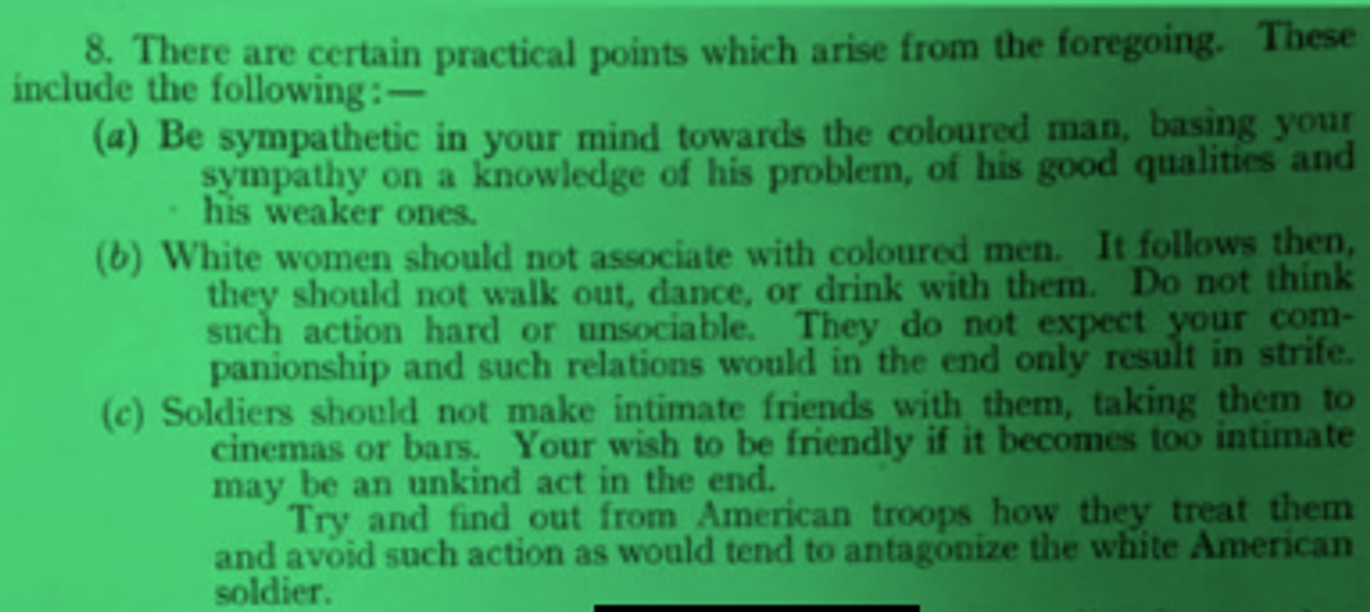
interracial sex WWII
GIs in GB
What is the significance of this?
GB formally opposed to US military segreg. (army stayed segreg. until 1948) BUT interfere w/segreg. arrangements Americans put in place around country
Though segreg. not officially enforced by GB govt, was unofficially enforced by GB police
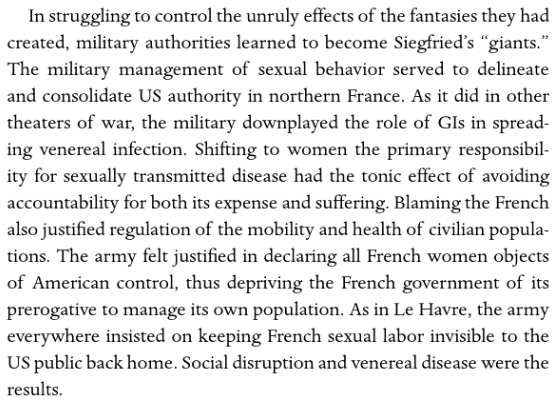
interracial sex WWII
(Mary Louise Roberts) 🇫🇷 ‘Black Peril’
Widespread fear & panic black men
primary sources
consequences
Why?
How were these attitudes exploited by women & military?
Signif.
War: movem. people, new sexual interactions
Widespread fear & panic black men commit. sexual assault 🥖 👩, as African-American GIs liberated France.
Racial prejudices French civilians & American soldiers materialised in…
public fear black men →
prop.accusations rape
MP Préfet in Normany reported "a visible fear of Black soldiers" amongst his constituents.
(Mezidon, Normandy France) Freq. reports black American soldiers pursuing local women, caus. widespread fear & alarm within community.
Police Reports: The chief of police in Caen and other local officials documented these incidents and reported a pervasive fear among women in Mézidon.
Prefect's Statement: The prefect of the city noted that black soldiers were "extremely feared by the population" due to their behavior towards women.
Why was this?
Charges against black soldiers based on hearsay & ‘sightings’ prod. in atmosphere racial hatred & fear.
Fear mixed-race relationships
Ignorance
(Rural communities) Most of them had likely only ever met white people + what they understood ab. anyone of colour was hugely racialised & racist
Trad. racial stereogypes concern. black 👨 as morally debauched
→ 👓n as civilised, sexually threatening, hypersexual (morally debauched) → nat. rapists.
Many French people harbored deep-seated racist attitudes influenced by their colonial history.
Emotional projections
Black soldiers → projection civilian fears concern. chaos war & tensions milit. occup
Black GIs → scapegoats for French postwar emotions, such as anger, frustration, and shame.
Political Transition: The terror must be understood within the broader context of the growing dominance of the U.S. in French life (see essay) →
fears exploited Forced to confront sexual excesses caused by its own propaganda…
Exploited by US military - scapegoated African American soldiers as primary perpetrators rapes to cover up scale crime.
(1 officer in Judge Advocate General’s Office) ‘incline tow. certain of the more serious crimes’.
(1944-5) 25/29 black soldiers hanged
African-American soldiers → symbol perversion within 🦬 military
Army racial prejudice legitim. harsh regulations restricting their freed. movem.
→ Army sexual control also secured internal boundaries of race bet. GIs.
Crisis masculinity…
Way to 🎭 masculinity after credited by war (see essay).
men felt had to protect white women ← new threat black masculinity
→ blamed African Americans; racial prejudice inverted the gendered logic of contamination: European women → victims rather than agents of contagion (see above)
How was these attitudes exploited by 👩…
Cherbourg Incident - Marie Rouvrière and John Phenix
(July 1944)
Context
Women sometimes accused black soldiers of rape to preserve their respectability, especially amid societal perceptions of black soldiers as hypersexual and threatening.
Consensual relationships with black men were often hidden due to fear of repercussions, leading to false rape allegations.
Accusation:
Rouvrière claimed Phenix broke into her house, raped her & threatened her with a knife.
She said she locked herself in the bedroom with Phenix to protect her children from witnessing the assault.
Contradictory Evidence:
Police found Phenix deeply asleep in Rouvrière’s bed with no signs of a struggle.
Physical evid. sexual trauma found.Phenix testified they had been seeing each other for months and had consensual meetings elsewhere.
Outcome:
Phenix was convicted and sentenced to ten years of hard labor despite significant doubts about Rouvrière's story and the circumstances.
Appeared Rouvrière fabricated the rape claim to cover up affair & protect her reputation.
Cherbourg Incident - Madeleine Peronneau
Incident:
Date: Night of August 10, 1944.
Location: Cherbourg, France.
Accuser: Madeleine Peronneau.
Allegation: Gang-raped by four black soldiers.
Testimony:
Peronneau claimed she was raped by each soldier and they attempted a second round.
She cried out for help after the men had been in her house for a while.
Contradictory Evidence:
A neighbor testified that Peronneau was a well-known prostitute who frequently entertained both white and black soldiers.
Prostitution and extortion: Prostitutes sometimes threatened black soldiers with rape charges to extort higher fees.
Outcome:
The neighbor’s testimony suggested Peronneau’s motive was financial extortion, not rape.
Without this testimony, the case would have been judged solely on Peronneau's claims.
…& military?
Forced to confront sexual excesses caused by its own propaganda, scapegoated African American soldiers as primary perpetrators rapes to cover up scale crime.
(1 officer in Judge Advocate General’s Office) ‘incline tow. certain of the more serious crimes’.
→ US military adequately invest. rape charges, concluded too quickly accused was black, arrived too easily@ identific. allegeged rapist, insuff. probed rep. accuser & witnesses, & erroneously assumed premeditated sexual viol. on part black men.
(1944-5) 25/29 black soldiers hanged
African-American soldiers → symbol perversion within 🦬 military
Army racial prejudice legitim. harsh regulations restricting their freed. movem.
→ Army sexual control also secured internal boundaries of race bet. GIs.
Signif.
good example how war can give us movem. new people & new sexual interactions + create crisis masculinity
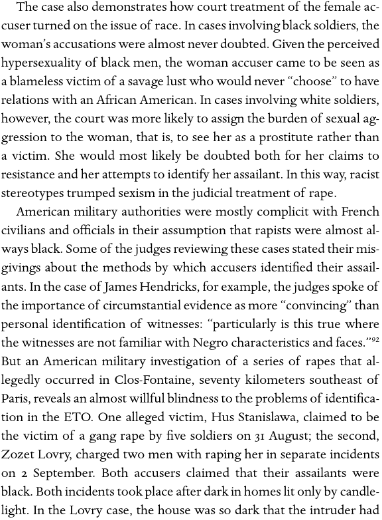
interracial sex WWII
Sim. phenomena emasculation Morocco…
premarital sex discouraged in Morocco
Arrival Americans linked w/sexual freedom → male resentment
song communicates anger local communities tow. Moroccan women for transgressing & sleeping w/American troops
disrupted gender roles as reuslt American troops appearanelty but regardless understood to be the imapct
we see sim. things in Egypt, Tunisia…
idea disruption & anger towards Americans
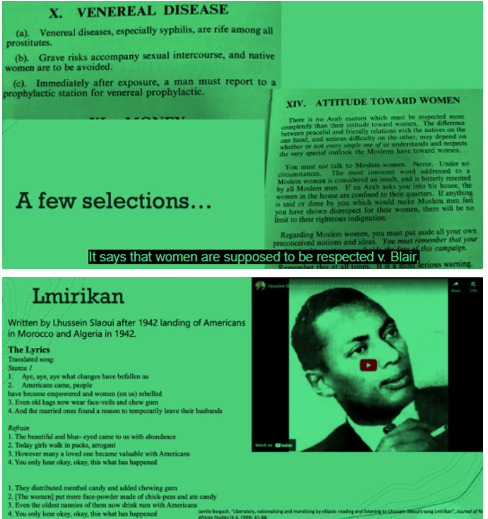
interracial sex
Understood their sexuality with exploitation young boys → understood themselves as pederasts though we’d view them as gay (paedophilia?)
Highly exploitative rel. took place due to econ. sit. + opportun. to explore homosexuality that had been denied to him → power imbalance
Internat. sex tourism
sexual orientalism understandings North Africa + mobilisation → Africa seen as place sexual awakening/ opportun.
Mobilisation → place sexual opportun. → intense exploitation these young boys by men who had money/ desire to do so.
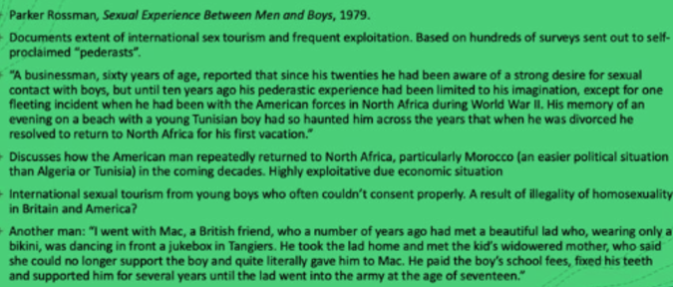
war also paved way for sexual viol… see brothel FCs + essay